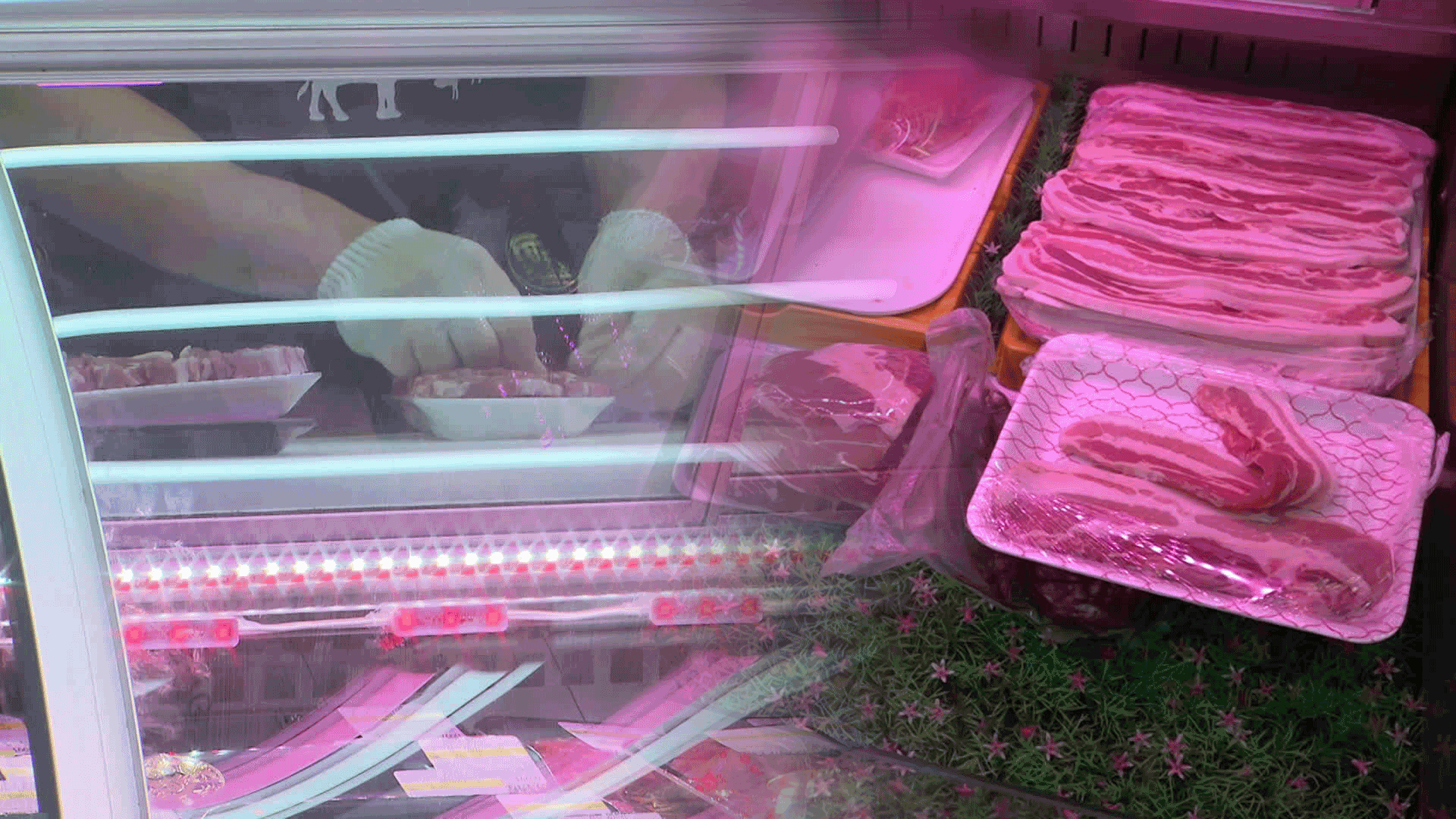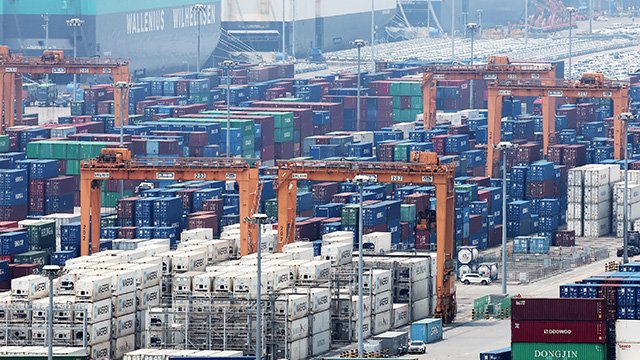[Anchor]
As the distribution of consumer coupons is expected to increase meat consumption, the government has increased the supply of Korean beef.
However, with the recent rise in meat prices, there have been increasing cases of cheap foreign meat being disguised as domestic products.
Our reporter Choi Ji-hyun accompanied the origin inspection team.
[Report]
Pork neck labeled as domestic is displayed at a butcher shop.
But a look inside the storage room reveals Canadian pork instead.
[Origin Inspection Team: "This is currently labeled as domestic outside."]
The team conducted a quick test on pork belly with no origin label.
Korean pork, which contains antibodies to swine fever, should show two lines, but this test shows only one—indicating it's imported.
Canadian pork was being passed off as domestic and sold at nearly double the price.
At another butcher shop, the storage was stacked with Mexican pork belly and jowl.
There was no origin label, and when customers asked, they were falsely told it was domestic pork.
[Origin Inspection Team: "This is a case of false origin labeling."]
[Butcher Shop Employee/Voice Altered: "I’m sorry. Please let it go just this once."]
This restaurant proudly advertises that it only uses "native Korean beef."
"Domestic" labels are plastered across the tables and walls.
But in reality, foreign meats like Canadian and American cuts were being mixed in and sold.
The actual origin is only noted in small print near the entrance, which can mislead customers—also a punishable offense.
[Kim Won-il/National Agricultural Products Quality Management Service: "As pork prices have risen compared to previous years, we're seeing more origin mislabeling cases."]
In anticipation of rising meat demand fueled by the consumer coupons, the government has increased the supply of Korean beef by 30%.
[Customer: "There’s so much to buy—meat, fish… We usually just eat regular pork."]
As summer vacation season coincides with coupon distribution, meat demand is growing—so consumers should remain alert against deceptive practices.
This is KBS News, Choi Ji-hyun.
As the distribution of consumer coupons is expected to increase meat consumption, the government has increased the supply of Korean beef.
However, with the recent rise in meat prices, there have been increasing cases of cheap foreign meat being disguised as domestic products.
Our reporter Choi Ji-hyun accompanied the origin inspection team.
[Report]
Pork neck labeled as domestic is displayed at a butcher shop.
But a look inside the storage room reveals Canadian pork instead.
[Origin Inspection Team: "This is currently labeled as domestic outside."]
The team conducted a quick test on pork belly with no origin label.
Korean pork, which contains antibodies to swine fever, should show two lines, but this test shows only one—indicating it's imported.
Canadian pork was being passed off as domestic and sold at nearly double the price.
At another butcher shop, the storage was stacked with Mexican pork belly and jowl.
There was no origin label, and when customers asked, they were falsely told it was domestic pork.
[Origin Inspection Team: "This is a case of false origin labeling."]
[Butcher Shop Employee/Voice Altered: "I’m sorry. Please let it go just this once."]
This restaurant proudly advertises that it only uses "native Korean beef."
"Domestic" labels are plastered across the tables and walls.
But in reality, foreign meats like Canadian and American cuts were being mixed in and sold.
The actual origin is only noted in small print near the entrance, which can mislead customers—also a punishable offense.
[Kim Won-il/National Agricultural Products Quality Management Service: "As pork prices have risen compared to previous years, we're seeing more origin mislabeling cases."]
In anticipation of rising meat demand fueled by the consumer coupons, the government has increased the supply of Korean beef by 30%.
[Customer: "There’s so much to buy—meat, fish… We usually just eat regular pork."]
As summer vacation season coincides with coupon distribution, meat demand is growing—so consumers should remain alert against deceptive practices.
This is KBS News, Choi Ji-hyun.
■ 제보하기
▷ 카카오톡 : 'KBS제보' 검색, 채널 추가
▷ 전화 : 02-781-1234, 4444
▷ 이메일 : kbs1234@kbs.co.kr
▷ 유튜브, 네이버, 카카오에서도 KBS뉴스를 구독해주세요!
- Fake origin meat sales rise
-
- 입력 2025-07-23 23:45:51

[Anchor]
As the distribution of consumer coupons is expected to increase meat consumption, the government has increased the supply of Korean beef.
However, with the recent rise in meat prices, there have been increasing cases of cheap foreign meat being disguised as domestic products.
Our reporter Choi Ji-hyun accompanied the origin inspection team.
[Report]
Pork neck labeled as domestic is displayed at a butcher shop.
But a look inside the storage room reveals Canadian pork instead.
[Origin Inspection Team: "This is currently labeled as domestic outside."]
The team conducted a quick test on pork belly with no origin label.
Korean pork, which contains antibodies to swine fever, should show two lines, but this test shows only one—indicating it's imported.
Canadian pork was being passed off as domestic and sold at nearly double the price.
At another butcher shop, the storage was stacked with Mexican pork belly and jowl.
There was no origin label, and when customers asked, they were falsely told it was domestic pork.
[Origin Inspection Team: "This is a case of false origin labeling."]
[Butcher Shop Employee/Voice Altered: "I’m sorry. Please let it go just this once."]
This restaurant proudly advertises that it only uses "native Korean beef."
"Domestic" labels are plastered across the tables and walls.
But in reality, foreign meats like Canadian and American cuts were being mixed in and sold.
The actual origin is only noted in small print near the entrance, which can mislead customers—also a punishable offense.
[Kim Won-il/National Agricultural Products Quality Management Service: "As pork prices have risen compared to previous years, we're seeing more origin mislabeling cases."]
In anticipation of rising meat demand fueled by the consumer coupons, the government has increased the supply of Korean beef by 30%.
[Customer: "There’s so much to buy—meat, fish… We usually just eat regular pork."]
As summer vacation season coincides with coupon distribution, meat demand is growing—so consumers should remain alert against deceptive practices.
This is KBS News, Choi Ji-hyun.
As the distribution of consumer coupons is expected to increase meat consumption, the government has increased the supply of Korean beef.
However, with the recent rise in meat prices, there have been increasing cases of cheap foreign meat being disguised as domestic products.
Our reporter Choi Ji-hyun accompanied the origin inspection team.
[Report]
Pork neck labeled as domestic is displayed at a butcher shop.
But a look inside the storage room reveals Canadian pork instead.
[Origin Inspection Team: "This is currently labeled as domestic outside."]
The team conducted a quick test on pork belly with no origin label.
Korean pork, which contains antibodies to swine fever, should show two lines, but this test shows only one—indicating it's imported.
Canadian pork was being passed off as domestic and sold at nearly double the price.
At another butcher shop, the storage was stacked with Mexican pork belly and jowl.
There was no origin label, and when customers asked, they were falsely told it was domestic pork.
[Origin Inspection Team: "This is a case of false origin labeling."]
[Butcher Shop Employee/Voice Altered: "I’m sorry. Please let it go just this once."]
This restaurant proudly advertises that it only uses "native Korean beef."
"Domestic" labels are plastered across the tables and walls.
But in reality, foreign meats like Canadian and American cuts were being mixed in and sold.
The actual origin is only noted in small print near the entrance, which can mislead customers—also a punishable offense.
[Kim Won-il/National Agricultural Products Quality Management Service: "As pork prices have risen compared to previous years, we're seeing more origin mislabeling cases."]
In anticipation of rising meat demand fueled by the consumer coupons, the government has increased the supply of Korean beef by 30%.
[Customer: "There’s so much to buy—meat, fish… We usually just eat regular pork."]
As summer vacation season coincides with coupon distribution, meat demand is growing—so consumers should remain alert against deceptive practices.
This is KBS News, Choi Ji-hyun.
이 기사가 좋으셨다면
-
좋아요
0
-
응원해요
0
-
후속 원해요
0
















이 기사에 대한 의견을 남겨주세요.